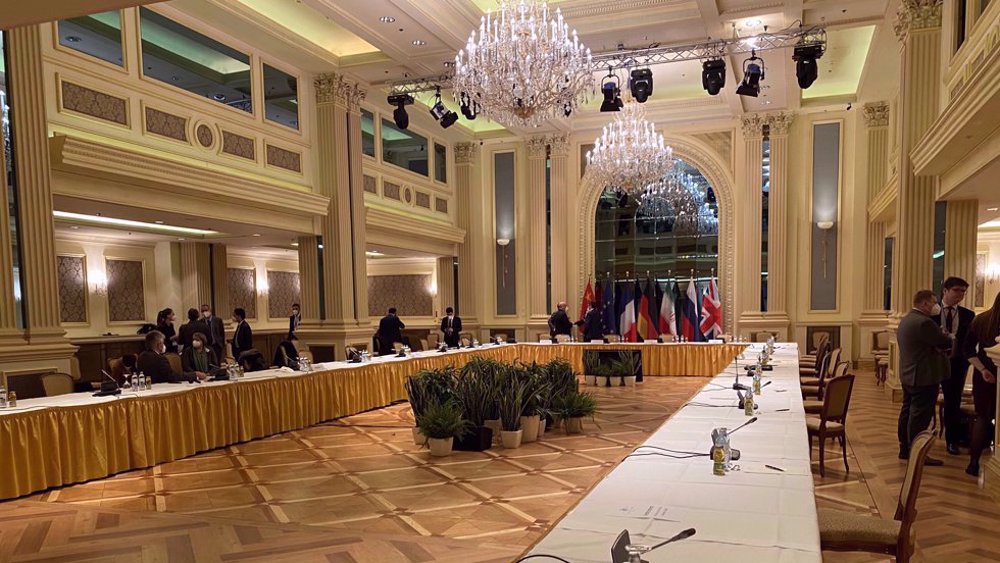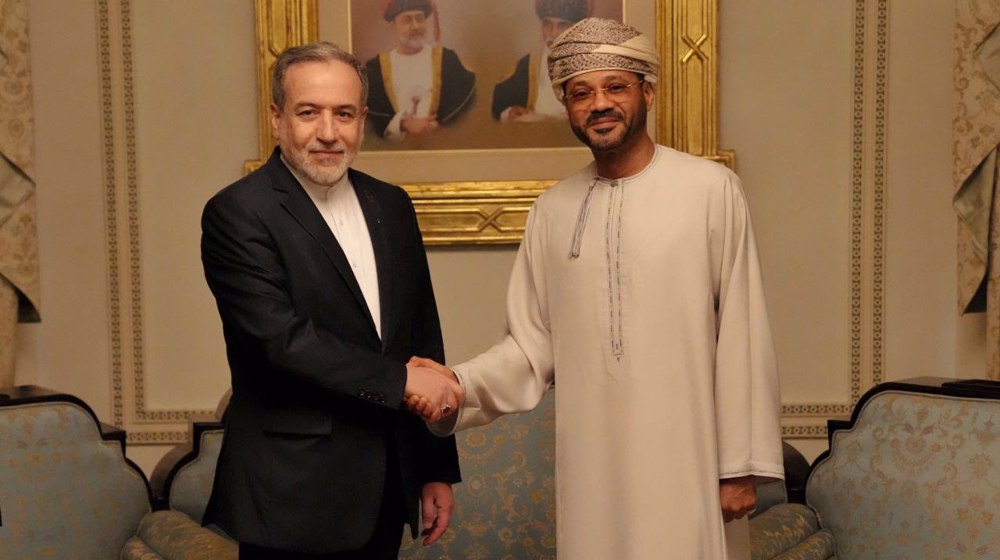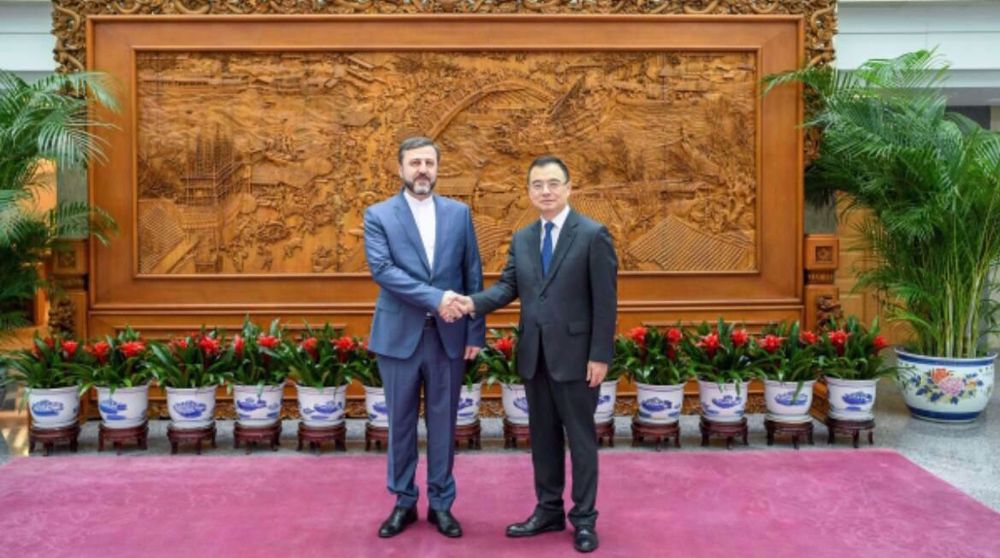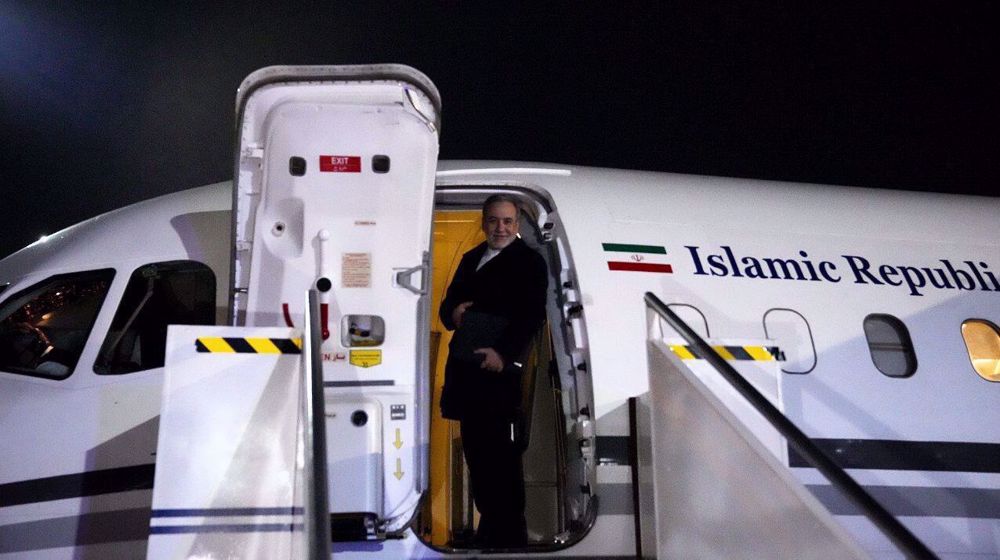P4+1 move from general words, enter 'drafting stage': Russian diplomat
A senior Russian diplomat says high-level talks in Vienna aimed at revitalizing a 2015 nuclear deal and bringing the United States back into it have moved ahead and entered "the drafting stage," but solutions to some of the issues are "still far away."
"Summing up the results of 2 weeks of deliberations on JCPOA restoration we can note with satisfaction that the negotiations entered the drafting stage," Russia's Permanent Representative to the International Organizations in Vienna Mikhail Ulyanov wrote on Twitter on Monday, referring to the nuclear deal, officially known as the Joint Comprehensive Plan of Action.
"Practical solutions are still far away, but we have moved from general words to agreeing on specific steps towards the goal," he added.
Summing up the results of 2 weeks of deliberations on #JCPOA restoration we can note with satisfaction that the negotiations entered the drafting stage. Practical solutions are still far away, but we have moved from general words to agreeing on specific steps towards the goal.
— Mikhail Ulyanov (@Amb_Ulyanov) April 19, 2021
At the end of talks between representatives from Iran and the P4+1 group of countries – Britain, France, Russia and China plus Germany –in the Austrian capital on Saturday, the sides agreed to continue bilateral and multilateral negotiations as well as technical consultations within the next days.
Within the format of the JCPOA Joint Commission meetings in Vienna, two expert-level working groups have been set up to lift the US sanctions against Iran and coordinate Tehran's return to full compliance with its nuclear obligations under the deal.
American diplomats were also present in Vienna, but they were not allowed to participate in the discussions, being kept abreast of the negotiations by the Europeans.
Speaking at the end of the talks, Iranian chief nuclear negotiator Abbas Araqchi said the participants reviewed the reports presented by the working groups and held “good discussions” about ways to lift sanctions.
“It seems that a new understanding is emerging and there is now common ground among all [the sides] on the final goal,” Araqchi, who serves as Iranian Deputy Foreign Minister for Political Affairs, added.
The EU, Russia and Iran all hailed progress at the talks, which came after an act of sabotage against Iran's Natanz nuclear facility.
On April 11, Iran reported an act of sabotage that led to a power failure at the Natanz uranium enrichment site. Officials, however, said the incident had not led to any casualties, damage or complications.
Iran has blamed the act of nuclear terrorism at Natanz on Israel, which has a history of carrying out sabotage acts against Tehran’s nuclear work and assassinating the country’s nuclear scientists.
Iranian officials have said while the aim of the attack was apparently to limit Iran's nuclear capability, all the centrifuges that went out of order due to the incident were of the IR1 type that are being replaced with more advanced ones.
In a response to the Israeli act of nuclear terrorism against Natanz site, Iran on Friday announced the beginning of uranium enrichment at 60-percent purity for peaceful purposes. The International Atomic Energy Agency (IAEA) verified the development on Saturday.
Former US president Donald Trump abandoned the nuclear agreement in May 2018 and unleashed the most aggressive sanctions ever against Iran under his “maximum pressure” campaign.
Joe Biden, the current president of the United States, has repeatedly spoken of willingness to rejoin the deal. But in practice he has so far been sticking with Trump’s futile pressure campaign. Washington says Tehran should return to ‘full compliance’ with the deal before the US comes back.
Iran says, as the party that has withdrawn from the JCPOA, it is the US that should take the first step by removing all the sanctions before Tehran would reverse its remedial measures.
Iranian officials also emphasize that Tehran will need enough time to verify the termination of the sanctions, and that it cannot be done within “a short time.”
EU's Borrell: There is real goodwill to reach agreement
The European Union's top diplomat, Josep Borrell, also on Monday said there is a willingness to save the JCPOA, citing progress at the talks in Vienna.
"I think that there is real goodwill among both parties (Iran and the United States) to reach an agreement, and that's good news," he said.
"I think that both parties are really interested in reaching an agreement, and they have been moving from general to more focused issues, which are clearly, on one side sanction-lifting, and on the other side, nuclear implementation issues," Borrell pointed out.
Progress made in intensive Vienna talks, more detailed work needed: EU's Mora
The European Union’s Deputy Secretary General and Political Director of European External Action Service Enrique Mora also on Monday said progress has been made in intensive Vienna talks, adding, however, that more detailed work is required.
"After intensive talks we have taken stock in the Joint Commission. Progress has been made in a far from easy task. We need now more detailed work," Mora tweeted.
After intensive talks we have taken stock in the Joint Commission. Progress has been made in a far from easy task. We need now more detailed work. Key that everyone is committed to the same objectives: US rejoining the #JCPOA and its full implementation. pic.twitter.com/84CDnzC4nf
— Enrique Mora (@enriquemora_) April 17, 2021
He added that all the sides are "committed to the same objectives: US rejoining the #JCPOA and its full implementation."
EU: JCPOA Joint Commission to convene in Vienna Tuesday
In a relevant development, the European External Action Services said in a statement on Monday that Iran and the P4+1 group of countries would hold another Joint Commission of the JCPOA meeting in a physical format on Tuesday.
JCPOA: Joint Commission resumes tomorrow, April 20. Participants will take stock of the progress in the ongoing discussions on the prospect of a possible return of the 🇺🇸 United States to the JCPOA. Read more: https://t.co/zndIgmfeTD
— European External Action Service - EEAS 🇪🇺 (@eu_eeas) April 19, 2021
It added that the JCPOA Joint Commission will be chaired on behalf of EU High Representative Borrell by Deputy Secretary General and Political Director of European External Action Service Enrique Mora. It will be attended by representatives of China, France, Germany, Russia, the United Kingdom and Iran.
"Participants will take stock of the progress in the ongoing discussions on the prospect of a possible return of the United States to the JCPOA and on how to ensure the full and effective implementation of the JCPOA by all sides," the statement read.
Iran, IAEA start talks on 'outstanding safeguards issues'
In another development on Monday, the IAEA and Iran started their talks to clarify IAEA’s queries about certain issues related to Iran’s nuclear program.
"The IAEA and Iran began today to engage in a focused process aimed at clarifying outstanding safeguards issues," the UN nuclear agency said in a statement, adding that the meeting was at the level of experts.
"As agreed in March... the discussions are being held at the level of technical experts," the IAEA said.
"Today's meeting took place in Vienna, as participating Iranian experts are also involved in separate meetings on the Joint Comprehensive Plan of Action at another location in the Austrian capital," it added.
VIDEO | Press TV's news headlines
Senior Russian general shot and wounded in Moscow: Officials
UK ordered in 'milestone' court ruling to pay $570 million for colonial-era massacre
VIDEO | Defying the rubble, Gaza opens its first face-to-face school since start of war
‘Ready for next round’: Million-man rally in Yemen backs Gaza, resistance
FM Araghchi departs Muscat for Doha following nuclear talks with US
Israeli keeps killing more Palestinian civilians in Gaza amid relentless ceasefire violations
Aliyev: Azerbaijani territory will not be used for threats against Iran










 This makes it easy to access the Press TV website
This makes it easy to access the Press TV website